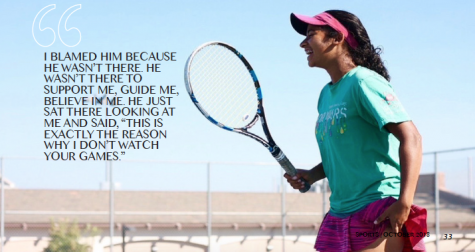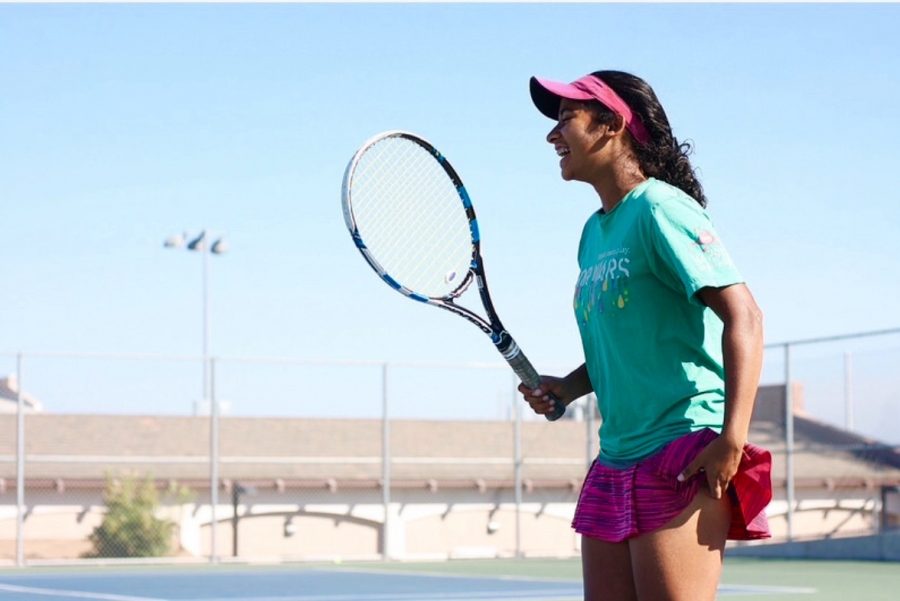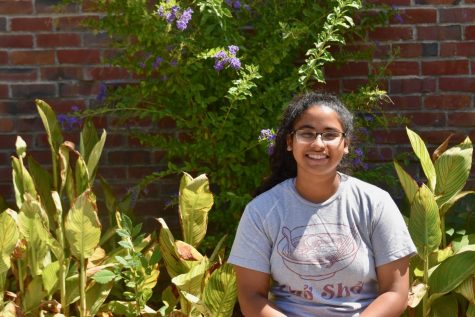His watchful eyes
How I started playing tennis for myself
October 24, 2018
As another ball went flying off the court, I looked over at my dad and threw my hands up in frustration. Slumping my shoulders in reaction, I looked at him again defeated and annoyed. Patiently, his eyes conveyed a message: stay loose. I nodded my head and moved on to the next point.
My dad was an open book when it came to my tennis. If I were playing badly, I could feel his cold stare radiating with anger and stabbing me in the back. I didn’t even have to look at him to know how he felt about my performance. I knew that some days, when he was just too frustrated, he would simply walk away, leaving me to clean up the mess I made on the court.
His expectations for me were too high. Slowly, I began to feel the pressure pile up and because of that, I wasn’t playing with the freedom I had before. Every step on the court was to prove to my father –– not myself –– that I belonged there. I was playing the game to satisfy him, and that’s how my habit of looking to my dad for assurance started.
His approval was the only thing I sought when I played tennis. Everything I did was for him. I depended on him. My tennis depended on him so much that when he stopped coming to my matches at the age of 15, I fell apart.
The first match I played without him watching, I caught myself many times looking over my shoulder — but he wasn’t there. I lost that match because my mind was clouded. Why he was sitting in the car instead of watching me play? Did he stop caring? Was he too disappointed to watch me play? Had he given up on me?

After I reported the score to the official, I began the walk back to the car to face my dad. Sitting in the car, I started to cry and blamed him for my loss. I blamed him because he wasn’t there. He wasn’t there to support me, guide me, believe in me. He just sat there looking at me and said, “This is exactly the reason why I don’t watch your games.”
He stood by his statement. He didn’t come to any of my matches after that. It took me some time to get accustomed to not having anyone there to depend on, rely on, to tell me ‘It’s okay, keep going. You got this.’ The presence of my dad had dictated the way I played tennis for six years. When he was watching, I would make it a point to finish points at the net, with a volley or overhead, just to impress him, to prove to him my game wasn’t one dimensional.
As time went on, I found myself looking at the ground shaking my hands, as if I were shaking my mistakes off, when I made a mistake, instead of looking over and finding my dad. As time went on, I began to feel the weight of my father’s expectations slowly lift off my shoulders. I felt as if I was breaking through invisible steel chains that restricted me for so long. Each match I played without the presence of my dad weakened the strength of the iron grip around to my feet until I was set free. As time went on, I began to believe in myself. As time went on, I no longer need my dad’s approval.
Maybe my dad did have a plan for me all along. Albeit it wasn’t in the easiest form, but it made me a better person and player.
He taught me a life lesson that there won’t always be someone in my corner to support me. I started playing for myself.

















